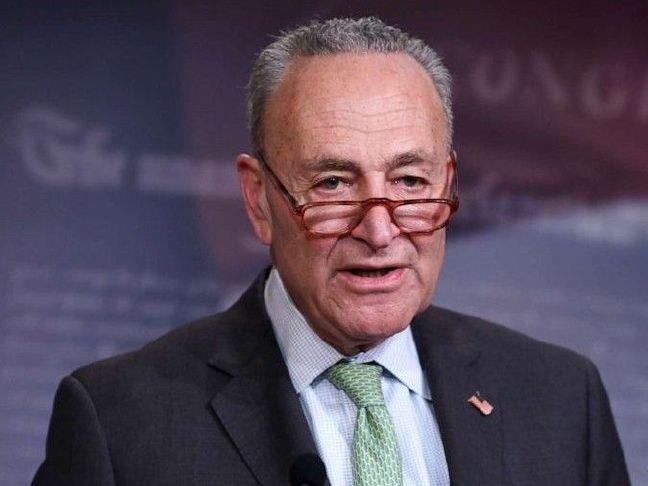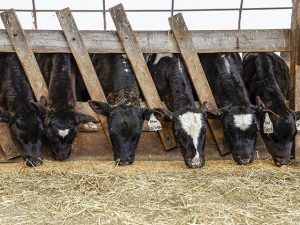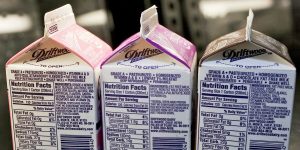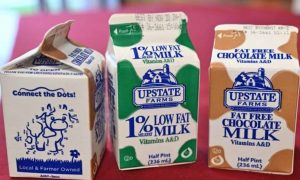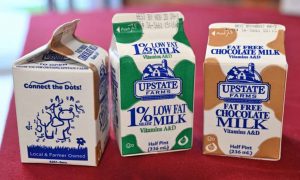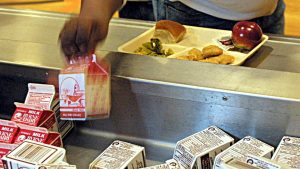
National milk carton shortage hits schools, Upstate dairy industry hard.
U.S. Senate Majority Leader Charles E. Schumer is calling on the U.S. Department of Agriculture (USDA) to take action on the national milk carton shortage hitting dairy farmers and schools in New York State and elsewhere across the country. Schumer urged the USDA to not only ensure New York dairy farmers have the technical support they need to get through the shortage, but also to work with industry leaders to devise creative solutions to get milk to our school lunchrooms and investigate the shortage to stop future disruptions and minimize downstream impacts.
“Milk is an essential part of our students’ school lunches and the lifeblood of our Upstate NY agricultural economy, but with a national milk carton shortage looming over our schools, now is the time for the USDA to step up to ensure our farmers get more support to continue their essential work. That is why I am calling on the USDA to start to work with industry leaders to address this shortage we are seeing nationwide, and provide all the leadership and technical support needed to help our New York dairy farmers,” said Sen. Schumer. “The USDA is uniquely positioned to investigate this problem from a national level and work with the dairy industry, our farmers, and schools to mitigate the impacts of shortages and propose solutions.”
Schumer explained that there is currently a nationwide shortage of half-pint milk cartons impacting New York’s dairy industry. He said that while there is not a shortage of milk, there is a supply chain problem with the cardboard cartons, consequently inhibiting suppliers’ ability to provide milk to schools and other customers in New York State and across the country. In school lunchrooms, milk is required to be served with every meal according to USDA nutrition standards. While schools are currently working with suppliers to figure out temporary solutions to ensure schools are receiving enough milk and student’s nutritional needs are being met, Schumer says now is the time for the USDA to work with industry and our dairy farmers to find solutions. It is currently unclear how long the shortage could last, which is why Schumer says it’s imperative the USDA take immediate action and proactively work on the problem to ensure that farmers and dairy suppliers across New York have the support and technical assistance needed to minimize the impacts of the shortage on their business and ensure milk can continue to be provided to schools across America.
Schumer added, “Given the potential downstream impacts of disruptions to the milk packaging supply chain we also need the USDA to investigate the causes of this carton shortage to determine how we can avoid further disruptions to our dairy farmers and any further steps we can be taking to mitigate problems of this nature in the future.”
Schumer emphasized that New York State is home to more than 3,200 dairy farms and is the country’s fifth largest dairy state, producing 15.66 billion pounds of milk in 2022. The dairy industry is a driver of significant economic impact in New York and is also a large part of the state’s culture. He said it is vital that we protect this critical industry and ensure it has the support it needs to weather these disruptions until the supply chain recalibrates.
Schumer explained that dairy producers across New York are also feeling the impact of the national shortage and are deeply concerned about getting their milk to consumers. The Upstate Niagara Cooperative, a significant industry supplier of half-pint milk carton packaging, is experiencing operational challenges that are negatively impacting their ability to supply schools with milk packaging orders. The shortage is forcing them to seek alternative, creative solutions, like switching other institutions, such as hospitals and nursing homes, from half-pints to larger sizes of milk containers, in order to meet schools’ demand. The co-op is also offering half-gallons of milk to schools as an alternative. Schumer said that New York’s dairy industry is the cream of the crop, as the largest single segment of the state’s agricultural industry. The state has more than 3,200 dairy farms, is the fifth-largest producer of milk, and is the largest producer of yogurt and cottage cheese in the nation.
SCHUMER’S LETTER TO USDA SECRETARY VILSACK
Dear Secretary Vilsack,
I write to urge United States Department of Agriculture’s (USDA) leadership to address and rectify the looming disruptions to the milk packaging supply chain, specifically related to milk carton shortages. While our dairy farmers are working hard to produce milk and our coops are striving to honor contracts with schools, nursing homes, and other important institutions, I’m concerned this disruption, if it is not swiftly addressed, could have negative impacts on our farmers, school and child nutrition programs, and children, seniors, and others who depend on milk for nutrition.
I have heard from schools across New York state that have been forced to alter their milk deliveries, reduce milk varieties served, purchase bulk milk to serve in plastic cups with lids, or purchase drink dispensers to continue meeting students’ nutritional needs. While there is still plenty of milk for kids to drink, the milk carton shortage is expected to last several months and will continue disrupting schools’ ability to adhere to federal nutrition standards.
New York State is home to more than 3,200 dairy farms and is the country’s fifth largest dairy state, producing 15.66 billion pounds of milk in 2022. The dairy industry is a driver of significant economic impact in New York and is also a large part of the state’s culture. It is vital that we protect this critical industry and ensure it has the support it needs to weather these disruptions until the supply chain recalibrates. Milk is an essential part of nutrition for our children and it is imperative we take every action possible to ensure they are able to continue to receive milk despite any potential disruptions.
The USDA is uniquely positioned to work with the dairy industry, our farmers, and schools to be able to address these shortages we are seeing nationwide and in New York. I strongly urge the USDA to work with dairy farmers and coops in New York, and the NYS Department of Agriculture & Markets, to find packaging alternatives, bring together industry partners to determine what immediate actions can be taken to mitigate the impacts of a shortage and find creative solutions so farmers have a market for their product and milk doesn’t go to waste. I also urge the USDA to afford maximum flexibility to our dairy farmers and coops and conduct outreach to ensure our farmers have all the technical assistance needed to ensure they can continue to provide milk to customers during this challenging time.
In addition, given the potential downstream impacts of disruptions to the milk packaging supply chain I ask the USDA to investigate the causes of this carton shortage to determine how we can avoid further disruptions to our dairy farmers and any further steps we can be taking to mitigate problems of this nature in the future.
I applaud USDA’s efforts thus far to provide schools with the guidance’s to accommodate shifts in milk packaging availability. This issue demands swift attention and action and I stand ready to help USDA however possible in ensuring these shortages in the supply chain have a minimal impact on our schools, students and dairy farmers.
